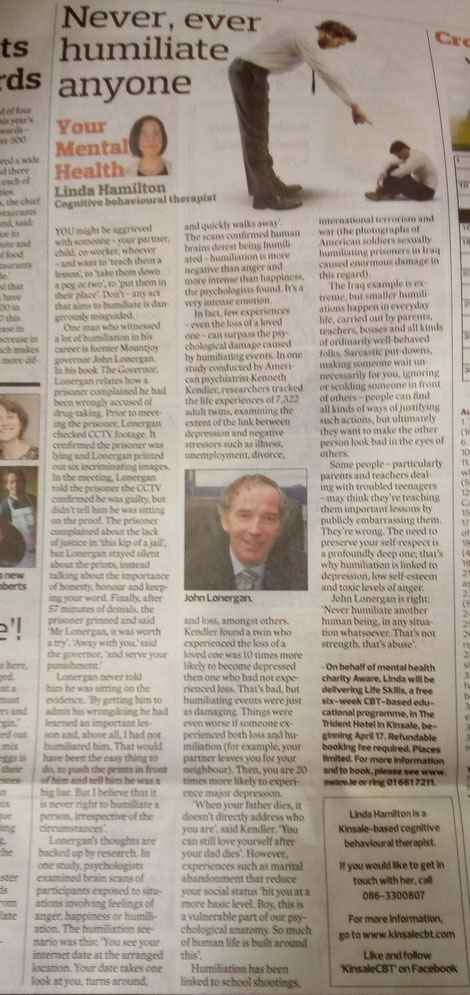
Humiliation is a very intense emotion. Few experiences – even the loss of a loved one – can surpass the psychological damage caused by humiliating events, as I cautioned in last week's Southern Star. The column is reproduced below.
You might be aggrieved with someone – your partner, child, co-worker, whoever – and want to “teach them a lesson”, to “take them down a peg or two”, to “put them in their place”. Don’t – any act that aims to humiliate is dangerously misguided.
One man who witnessed a lot of humiliation in his career is former Mountjoy governor John Lonergan. In his book The Governor, Lonergan relates how a prisoner complained he had been wrongly accused of drug-taking. Prior to meeting the prisoner, Lonergan checked CCTV footage. It confirmed the prisoner was lying and Lonergan printed out six incriminating images. In the meeting, Lonergan told the prisoner the CCTV confirmed he was guilty, but didn’t tell him he was sitting on the proof. The prisoner complained about the lack of justice in “this kip of a jail”, but Lonergan stayed silent about the prints, instead talking about the importance of honesty, honour and keeping your word. Finally, after 57 minutes of denials, the prisoner grinned and said ‘Mr Lonergan, it was worth a try’. Away with you, said the governor, and serve your punishment.
Lonergan never told him he was sitting on the evidence. ‘By getting him to admit his wrongdoing he had learned an important lesson and, above all, I had not humiliated him. That would have been the easy thing to do, to push the prints in front of him and tell him he was a big liar. But I believe that it is never right to humiliate a person, irrespective of the circumstances’.
Lonergan’s thoughts are backed up by research. In one study, psychologists examined brain scans of participants exposed to situations involving feelings of anger, happiness or humiliation. The humiliation scenario was this: ‘You see your internet date at the arranged location. Your date takes one look at you, turns around, and quickly walks away’. The scans confirmed human brains detest being humiliated – humiliation is more negative than anger and more intense than happiness, the psychologists found. It’s a very intense emotion (continued below...)
HUMILIATION AND DEPRESSION
In fact, few experiences – even the loss of a loved one – can surpass the psychological damage caused by humiliating events. In one study conducted by American psychiatrist Kenneth Kendler, researchers tracked the life experiences of 7,322 adult twins, examining the extent of the link between depression and negative stressors such as illness, unemployment, divorce, and loss, amongst others. Kendler found a twin who experienced the loss of a loved one was 10 times more likely to become depressed then one who had not experienced loss. That’s bad, but humiliating events were just as damaging. Things were even worse if someone experienced both loss and humiliation (for example, your partner leaves you for your neighbour). Then, you are 20 times more likely to experience major depression.
‘When your father dies, it doesn't directly address who you are’, said Kendler. ‘You can still love yourself after your dad dies'. However, experiences such as marital abandonment that reduce your social status ‘hit you at a more basic level. Boy, this is a vulnerable part of our psychological anatomy. So much of human life is built around this’.
Humiliation has been linked to school shootings, international terrorism and war (the photographs of American soldiers sexually humiliating prisoners in Iraq caused enormous damage in this regard).
EVERYDAY HUMILIATIONS
The Iraq example is an extreme one, but smaller humiliations happen in everyday life, carried out by parents, teachers, bosses and all kinds of folks who think they’re perfectly decent, well-behaved people. Sarcastic put-downs, making someone wait unnecessarily for you, ignoring or scolding someone in front of others – people can find all kinds of ways of justifying such actions, but ultimately they want to make the other person look bad in the eyes of others.
Some people – particularly parents and teachers dealing with troubled teenagers – may think they’re teaching them important lessons by publicly embarrassing them. They're wrong. The need to preserve your self-respect is a profoundly deep one; that's why humiliation is linked to depression, low self-esteem and toxic levels of anger.
John Lonergan is right: ‘Never humiliate another human being, in any situation whatsoever. That’s not strength, that’s abuse’.